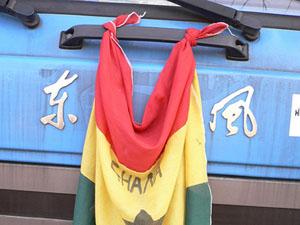China looks to invest in Africa
Chinese truck in Ghana. (Image: oneVillage Initiative, Creative Commons)
The global economic slowdown is hammering Japan. It’s also hit China, but it has not put a damper on China’s efforts to expand its investment in Africa. President Hu Jintao of China wraps up a four-nation tour of Africa in Mauritius. The Chinese leader has been sending a message that China will continue to expand trade with Africa, even during this economic slump.
“The World’s” Laura Lynch found that people in Zambia have mixed feelings about the way the Chinese do business.
Each morning in the sprawling Kamwala marketplace in downtown Lusaka, more than 100 Chinese shop owners arrive, open up their stores, then melt away into the background. They let Zambian clerks deal with customers. They’ve even painted over the Chinese names on shop fronts. The shift came in 2006, after rioters and looters attacked businesses here. It was a sharp sign of the resentment toward Beijing’s growing influence. In front of one of the biggest and most popular Chinese owned general stores, a well-dressed woman watches as three young men load a dining table and chairs into her SUV.
Mumbi Phiri is an opposition member of Parliament. The party has campaigned on an anti-Chinese platform in the past, so she probably shouldn’t be shopping here. But Phiri pleads necessity: “Yes, I do buy and this is my favorite shop. But I really don’t have a choice, because in Zambia the industry has collapsed. We used to have things made here. We used to make our own cooking oil. We had rope, soap, and everything. Now, we are exposed to these already finished imported goods which are coming into the country. Do I really have a choice?”
China has portrayed its push into Africa as a win-win situation for everyone. But here in Zambia, many feel like losers in the contest for the country’s future. The sizzle and the smell means lunch will be ready soon at Jemima’s restaurant and guest house. Four women bustle around the kitchen frying chicken, chopping vegetables and boiling a corn based porridge known as mealie-meal. Betty Sera runs the business, but she’s also been studying business administration on the side.
Sera has watched the Chinese move in, initially buying up huge mining and resource enterprises. In their wake came other small-scale entrepreneurs setting up farms and restaurants and cutting into her business: “They can come in with money that they have borrowed from their countries at a cheaper rate and invest heavily and buy all the equipment they need and everything. We can’t, as smaller players because we don’t have the capital.”
Sera would like to see the Zambian government channel more support to local businesses so they can not only survive but thrive. She, like so many Zambians, can easily tap into a well of bitterness about the Chinese: “This is my country, and I’ve got maybe 15 workers here and I’m providing employment to these guys, and they’re aware that I’ve got a heart. I’m working with these girls. I know I’m here to stay, so I have to look after my staff. They don’t look after their staff, but everybody is just quiet about that.”
It’s certainly not something Chinese officials will talk about. Requests for an interview with a representative of the Chinese business community in Zambia was met with polite refusals.
But Zambian business officials, like Hanson Sindowe of the Chamber of Commerce, cheers China’s efforts to invest in Africa and Africans: “Their model is user-friendly to the Zambian society and Zambian business people. I think the Chinese identified African requirements. I mean, if you look at the industries, they depend on a lot of manpower.”
Up north, where the trucks rumble through what’s called the Copperbelt, it is indeed all about the jobs. The copper mines here employ thousands of Zambians. But beside this stretch of highway is a reminder of just why hostility toward the Chinese runs deep. A few yards away from the road, a semicircle of white marble graves mark the remains of the men killed in Zamiba’s biggest industrial disaster. An explosion in 2005 at a factory that was part of the biggest Chinese-owned mine in Zambia killed 46 Zambian workers. Two years later, in 2007, the anger was still so deep Chinese President Hu Jintao cancelled a trip to the region to open a new smelter.
Not far from the mine, a lazy Sunday afternoon sees the residents of the Chambishi township spilling onto the road outside the local bar. The bar is really a shack, and the township is really a slum with no running water. Piles of garbage buzz with flies and vast puddles swarm with mosquitoes. Miners lined up to complain about their Chinese masters: “The conditions are very poor compared to other mines. It’s not up-to-date. They don’t have safety officers in mines. They don’t have qualified safety officers. They do things the way they know them according to their culture. So they have to follow our culture.” But they don’t. They keep to themselves, living in walled-off compounds where they live and eat between shifts.
Hanson Sindowe, of the Chamber of Commerce, can’t point to anything specific – but he insists his Chinese colleagues are trying to be better corporate citizens: “I think the Chinese themselves are changing their model slightly. What’s happening now, they are beginning to listen to what the local people need and want and would appreciate.”
For all the people here, though, there seems precious little to show for all the multi-mullion dollar deals. They see places like this cemetery as sad examples of their greatest fear – that China is only here to take what it can get.
PRI’s “The World” is a one-hour, weekday radio news magazine offering a mix of news, features, interviews, and music from around the globe. “The World” is a co-production of the BBC World Service, PRI and WGBH Boston.
